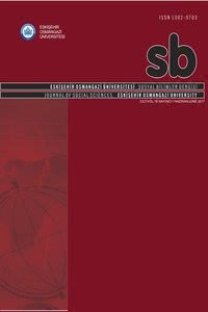Sütunlaşma Teorisi Perspektifinden Türkiye
Sütunlaşma teorisi, Konsosyonalizm, Korporatizm, Özrgürlük
Türkiye From The Perspective of the Theory of Pillarization
Pillarization, Consociationalism, Corporatism, Emancipation,
___
- Bax, Erik Hans. 1995. Cleavage in Dutch Society: Changing Patterns of Social and Economic Discrimination. Graduate School/Research Institute Systems, Organisation and Management, University of Groningen.
- Becker, Uwe. 1993. Nederlandse Politiek in Historisch En Vergelijkend Perspectief. Het Spinhuis.
- Blom, Johannes Cornelis Hans. 2000. ‘Pillarisation in Perspective’. West European Politics 23(3):153-64.
- Dekker, Paul, and Peter Ester. 1996. ‘Depillarization, Deconfessionalization, and de-Ideologization: Empirical Trends in Dutch Society 1958-1992’. Review of Religious Research 325-41.
- Hoogenboom, Marcel, Peter Scholten, and Vakgroep Maatschappelijke Risico’s en Veiligheid. 2008. ‘Migranten En de Erfenis van de Verzuiling in Nederland’. Beleid En Maatschappij 35(2):107-24.
- Irwin, Galin, Cees van der Eijk, Joop Van Holsteyn, and Kees Niemöller. 1987. ‘Verzuiling, Issues, Kandidaten En Ideologie in de Verkiezingen van 1986’. Acta Politica 22(2):129-79.
- Kapani, Münci. 1992. Politika Bilimine Giriş. Vol. 6. Bilgi Yayınevi.
- Kickert, Walter. 2003. ‘Beneath Consensual Corporatism: Traditions of Governance in the Netherlands’. Public Administration 81(1):119-40.
- Kolçak, Hakan. 2020. ‘Consociationalism under Examination: Is Consociationalism the Optimal Multiculturalist Approach for Turkey?’ Digest of Middle East Studies 29(1):26-52.
- Laicists, Militant, Muslim Democrats, and Liberal Secularists. 2013. ‘Since the Election of the Justice and Development Party (Adalet ve Kalkınma Partisi, AKP) to National Government in 2002 (and Again in 2007 and 2011), Turkish Society Has Existed on a Political Knife-Edge. Rumors of a Military Intervention Have Been Fueled by the Detailed Pub-Lication of a Number of Aborted Coups Plotted by the Turkish Armed’. Muslim Secular Democracy: Voices from Within 253.
- Lijphart, Arend. 1969. ‘Consociational Democracy’. World Politics 21(2):207-25.
- Lijphart, Arend. 2008. Verzuiling, Pacificatie En Kentering in de Nederlandse Politiek. Amsterdam University Press. Miert, Jan van. 1992. ‘Verdeeldheid En Binding. Over Lokale, Verzuilde En Nationale Loyaliteiten’. BMGN-Low Countries Historical Review 107(4):670-89.
- Parla, Taha, and Andrew Davison. 2008. ‘CHAPTER TWO. Secularism and Laicism in Turkey’. Pp. 58–75 in Secularisms. Duke University Press.
- Rooy, Piet de. 1995. ‘Zes Studies over Verzuiling’. BMGN-Low Countries Historical Review 110(3):380-92.
- Rooy, Piet de. 2001. ‘Voorbij de Verzuiling?’ BMGN-Low Countries Historical Review 116(1):45-57.
- Şahin, Enis, and Bilal Tunç. 2015. ‘Demokrat Parti’nin Kuruluş Süreci ve DP–CHP Siyasî Mücadelesi (1945-1947)’. Sosyal ve Kültürel Araştırmalar Dergisi (SKAD) 1(2):31-69.
- Stuurman, Siep. 1991. ‘1848: Revolutionary Reform in the Netherlands’. European History Quarterly 21(4):445-80. Van Doorn, Jan Abraham Anne. 1956. ‘Verzuiling: Een Eigentijds Systeem van Sociale Controle’. Sociologische Gids 3(3-4):41-49.
- Wintle, Michael. 2000. ‘Pillarisation, Consociation and Vertical Pluralism in the Netherlands Revisited: A European View’. West European Politics 23(3):139-52.
- Başlangıç: 2000
- Yayıncı: -
Sosyal Bilimlerde PLS-YEM Kullanım Rehberi: Hiyerarşik Yapı Modellemesi ile Bir Uygulama
Toplumsal Cinsiyet Bağlamında Turizm Reklam Filmlerinde Kadın İmgesi
KARL POPPER’DA YANLIŞLANABİLİRLİK İLKESİ VE TÜMEVARIM SORUNU
COVID-19 Aşısı İle İlgili Kamu Spotlarının Halkın Üzerindeki Etkisinin Değerlendirilmesi
Ezgi SALIŞ, Muhammed Fatih ÖNSÜZ, Selma METİNTAŞ
Çok Kriterli Karar Verme Yaklaşımı ile Sosyal Hizmet Mesleki Uygunluk Kriterlerinin Sıralanması
Mehmet Serhat PANCAROĞLU, Nurullah YELBOĞA
Ortak ve İşbirliğine Dayalı Eylem Bağlamında İletişim Sistemlerinin Gelişimi
Çevresel Kuznets Eğrisinin Türkiye'de Geçerliliği: 1970-2020 Örneği
Osman TUZUN, Hatice ARMUTCUOĞLU TEKİN
Makroekonomik Değişkenlerin ve Jeopolitik Risk Endeksinin Savunma Harcamalarına Etkisi
Makro-Bölgeselcilikten Radikal Sağ Popülizme: Lega Nord Örneği
